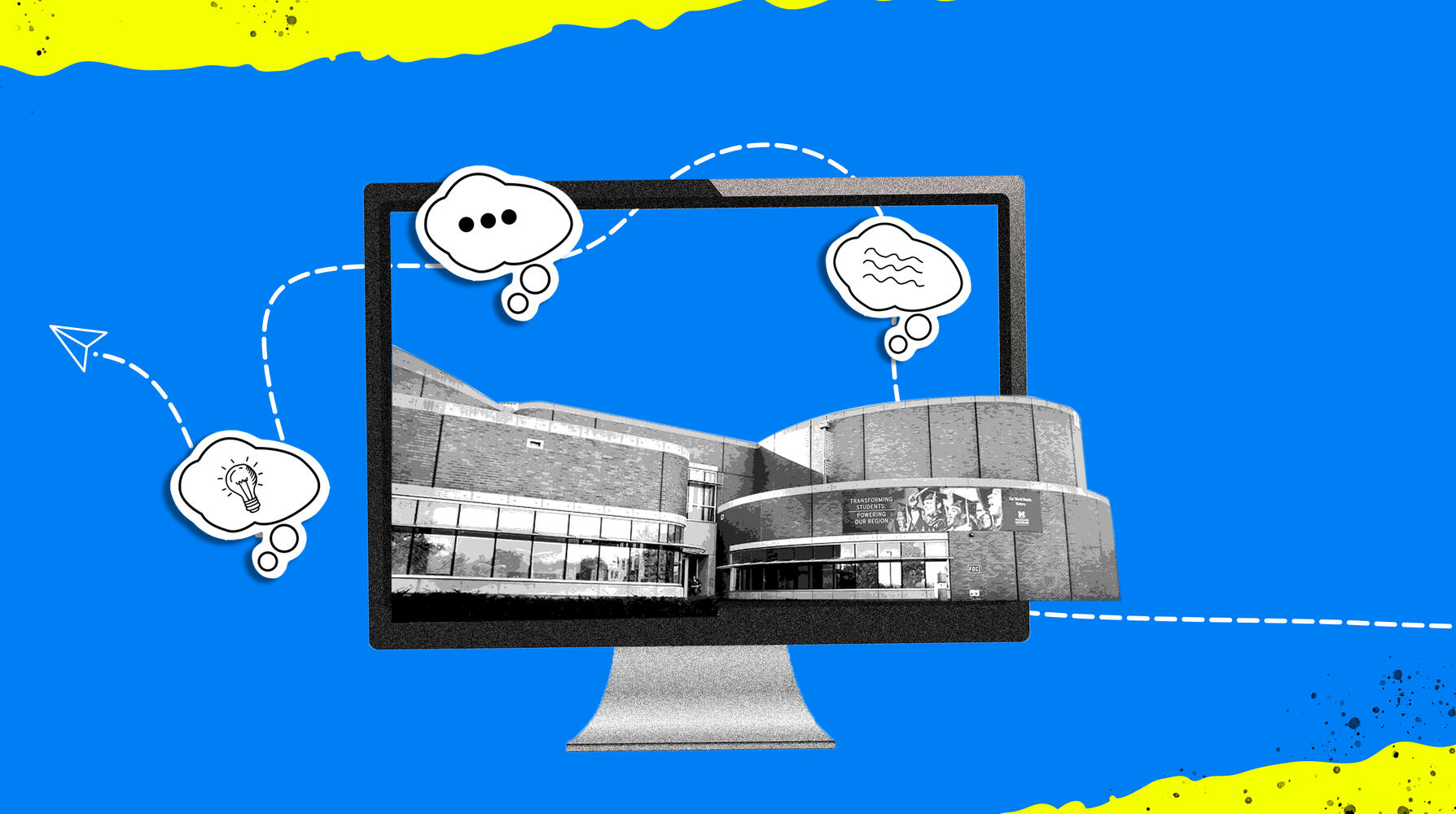[et_pb_section fb_built=”1″ _builder_version=”4.7.5″ _module_preset=”default”][et_pb_row _builder_version=”4.6.6″ _module_preset=”default”][et_pb_column type=”4_4″ _builder_version=”4.6.6″ _module_preset=”default”][et_pb_text _builder_version=”4.9.4″ _module_preset=”default” hover_enabled=”0″ sticky_enabled=”0″]
Republished with permission from the University of Michigan Dearborn News blog.
April 21, 2021
[/et_pb_text][et_pb_text _builder_version=”4.9.4″ _module_preset=”default” border_color_all=”RGBA(0,0,0,0)”]
Part oral history and part social media, a new digital storytelling project gives UM-Dearborn students the opportunity to share their unique experiences directly with the outside world.
Expanding existing campus resources and technologies through a Coalition for Transformational Education grant, experts in the new Experience Plus program including the Mardigian Library, Career Services, and Global Education, will mentor a cohort of students for its More Than A Single Story: UM-Dearborn Speaks project starting this fall.
More Than a Single Story will create a genuine, sophisticated portrait of the UM-Dearborn community by giving students a way to express their identities and sense of purpose, said Mardigian Library Director and Associate Provost Maureen Linker.
To properly engage with a place or a person, Linker says a multitude of stories is needed. Over the span of two academic years, More Than a Single Story will provide students, who will be paid for their work, with a chance to share their stories while challenging the myths about Dearborn, the Detroit Metropolitan area, regional commuter campuses, the surrounding Muslim-American community, and other social divisions between the city of Detroit and the surrounding suburbs.
“Being defined by a single story can lead to characterizations through xenophobic or racist labels. For example, The Simpsons satirically portrayed Dearborn and our campus as being under Sharia Law, reflecting misperceptions and misrepresentations of our community,” Linker says. “Under the proper mentorship, digital storytelling can counterbalance stereotypes and enable students to take agency over the portrayals of their identity and communities. It can foster a cognitive shift that aids students in discovering what drives them and shapes their purpose, which will stay with them long after they graduate.”
Linker says data from a 2018 Gallup survey of college graduates shows people who reported meaningful experiential learning opportunities and having “someone who cared about me as a person” were more than twice as likely to also report high levels of well-being and work engagement later in life.
Chancellor Domenico Grasso looks forward to hearing student stories and says campus continuously explores how to best offer high-impact experiential learning.
“The Coalition for Transformational Education grant, which is awarded to a small and select number of institutions such as University of VIrginia, and University of Southern California, Wellesley College, Bucknell University and Olin College, demonstrates our commitment to the success and well-being of our student while on campus and beyond,” Grasso says. “We hope that this pilot initiative will help UM-Dearborn students better define their identity, embrace agency and identify purpose. The public manifestation of this project will be a transformation of the single story of our community into a dynamic, complex tapestry of who our students are, what drives them and where they want to be in the future.”
The first cohort will begin work in the fall — interested students can apply via UM-Dearborn’s Career Connections l in summer semester — and stories will be exhibited at the Mardigian Library in fall 2022.
Following the digital storytelling exhibit, campus organizers will invite Henry Ford College and local high school students to participate in a digital storytelling event. Linker says they’d also like to host a monthly live storytelling event and offer digital storytelling workshops led by UM-Dearborn students.
With the multifaceted nature of the project, Linker says students will develop important professional skills like critical speaking, thinking and listening, while also having the space to work creatively.
“Digital storytelling literacy can serve as an effective means for students to discover and articulate their values and make the connection between their values and career readiness,“ Linker says. “As the world continues to become more digital, experience in digital storytelling will be more and more valuable across all fields from art to engineering, from business to biology.”
Linker says sharing multiple stories creates connections, provides inspiration and promotes education.
“Classmates may find that they share similar experiences or interesting differences from which to learn. First-generation Americans will have a toolset to share a piece of their lives with relatives halfway across the globe. Students trying to express themselves to older family members will have another avenue to do so,” Linker says. “Communities will not merely be defended or strengthened by this project; they will be built.”
The More Than a Single Story team includes Mardigian Library Director and Associate Provost Maureen Linker, Experience+ Executive Director Laurie Sutch, Mardigian Library Associate Director Holly Sorscher, Global Engagement Director Scott Riggs, Mardigian Library Research Center Head Christopher Spilker, Mardigian Library User Services Head Monica Adams, Mardigian Library Strategic Initiatives Manager Kelsey Parker and Experience+ Assistant Director Britta Roan.
[/et_pb_text][/et_pb_column][/et_pb_row][/et_pb_section]


